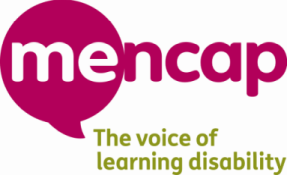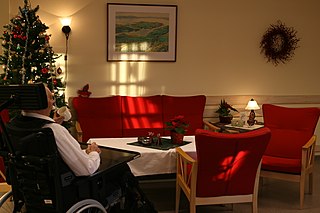Developmental disability is a diverse group of chronic conditions, comprising mental or physical impairments that arise before adulthood. Developmental disabilities cause individuals living with them many difficulties in certain areas of life, especially in "language, mobility, learning, self-help, and independent living". Developmental disabilities can be detected early on and persist throughout an individual's lifespan. Developmental disability that affects all areas of a child's development is sometimes referred to as global developmental delay.

The Royal Mencap Society is a charity based in the United Kingdom that works with people with learning disabilities. Its Charity Number is 222377.

Long-term care (LTC) is a variety of services which help meet both the medical and non-medical needs of people with a chronic illness or disability who cannot care for themselves for long periods. Long-term care is focused on individualized and coordinated services that promote independence, maximize patients' quality of life, and meet patients' needs over a period of time.
"The normalization principle means making available to all people with disabilities patterns of life and conditions of everyday living which are as close as possible to the regular circumstances and ways of life or society." Normalization is a rigorous theory of human services that can be applied to disability services. Normalization theory arose in the early 1970s, towards the end of the institutionalisation period in the US; it is one of the strongest and long lasting integration theories for people with severe disabilities.

Deinstitutionalisation is the process of replacing long-stay psychiatric hospitals with less isolated community mental health services for those diagnosed with a mental disorder or developmental disability. In the late 20th century, it led to the closure of many psychiatric hospitals, as patients were increasingly cared for at home, in halfway houses and clinics, in regular hospitals, or not at all.
Supported living or supportive living refers to a range of services and community living arrangements (CLAs) designed with individuals with disabilities and their families to support disabled citizens to attain or retain their independence or interdependence in their local communities. Supported living is recorded in the history of the NASDDDS, celebrating its 50th anniversary. Community Supported Living Arrangements (CSLA) was a landmark federal multi-state demonstration to illustrate the federal role in community living in the US. Supported living is considered a core service or program of community living programs funded through federal-state-local partnerships.
A group home, congregate living facility, care home, adult family home, etc., is a structured and supervised residence model that provides assisted living and medical care for those with complex health needs. Traditionally, the model has been used for children or young people who cannot live with their families or afford their own homes, people with chronic disabilities who may be adults or seniors, or people with dementia and related aged illnesses. Typically, there are no more than six residents, and there is at least one trained caregiver there 24 hours a day. In some early "model programs", a house manager, night manager, weekend activity coordinator, and four part-time skill teachers were reported. Originally, the term group home referred to homes of 8 to 16 individuals, which was a state-mandated size during deinstitutionalization. Residential nursing facilities, also included in this article, may be as large as 100 individuals in 2015, which is no longer the case in fields such as intellectual and developmental disabilities. Depending on the severity of the condition requiring one to need to live in a group home, some clients are able to attend day programs and most clients are able to live normal lifestyles.
Respite care is planned or emergency temporary care provided to caregivers of a child or adult.
Texas state supported living centers are a collection of residential facilities run by the state for people with intellectual disabilities in Texas, United States. The schools, operated by the Texas Health and Human Services Commission operate under the Federal Intermediate Care Facilities for Individuals with Intellectual Disabilities (ICF/IID) program.
Carers' rights are rights of unpaid carers or caregivers to public recognition and assistance in preventing and alleviating problems arising from caring for relatives or friends with disabilities. The carers' rights movement draws attention to issues of low income, social exclusion, damage to mental and physical health identified by research into unpaid caregiving. In social policy and campaigning the movement distinguishes such people's situation from that of paid careworkers, who in most developed countries have the benefit of legal employment protection and rights at work. With an increasingly ageing population in all developed societies, the role of carer has been increasingly recognized as an important one, both functionally and economically. Many organizations which provide support for persons with disabilities have developed various forms of support for carers/caregivers as well.

Intellectual disability (ID), also known as general learning disability and mental retardation, is a generalized neurodevelopmental disorder characterized by significant impairment in intellectual and adaptive functioning that is first apparent during childhood. Children with intellectual disabilities typically have an intelligence quotient (IQ) below 70 and deficits in at least two adaptive behaviors that affect everyday, general living. According to the DSM-5, intellectual functions include reasoning, problem solving, planning, abstract thinking, judgment, academic learning, and learning from experience. Deficits in these functions must be confirmed by clinical evaluation and individualized standard IQ testing. On the other hand, adaptive behaviors include the social, developmental, and practical skills people learn to perform tasks in their everyday lives. Deficits in adaptive functioning often compromises an individual's independence and ability to meet their social responsibility.
Disability abuse is when a person with a disability is abused physically, financially, sexually and/or psychologically due to the person having a disability. This type of abuse has also been considered a hate crime. The abuse is not limited to those who are visibly disabled or physically deformed, but also includes those with learning, intellectual and developmental disabilities or mental illnesses.
The Family Movement, also known in the past as the Parent Movement, is an arm of the disability rights movement, a larger social movement. The Family Movement advocates for the economic and social rights of family members with a disability. Key elements include: social inclusion; active participation; a life of meaning; safety; economic security; accessibility and self-determination. The family movement has been critical in closing institutions and other segregated facilities; promoting inclusive education; reforming adult guardianship to the current supported decision-making; increasing access to health care; developing real jobs; fighting stereotypes and reducing discrimination.
Intermediate Care Facilities for Individuals with Intellectual Disabilities (ICF/IID), formerly known as Intermediate Care Facilities for Mental Retardation (ICF/MR), is an American Medicaid-funded institutional long-term support and service (LTSS) for people with intellectual disabilities or related conditions. Section 1905(d) of the Social Security Act enacted benefits and made funding available for "institutions" for individuals with intellectual or related conditions. According to federal law 42 CFR § 440.150 the purpose of ICD/IIDs is to "furnish health or rehabilitative services to persons with Intellectual Disability or persons with related conditions."
Community integration, while diversely defined, is a term encompassing the full participation of all people in community life. It has specifically referred to the integration of people with disabilities into US society from the local to the national level, and for decades was a defining agenda in countries such as Great Britain. Throughout recent decades, community integration programs have been increasingly effective in improving healthcare access for people with disabilities. They have been valued for providing a "voice for the voiceless"
Family support is the support of families with a member with a disability, which may include a child, an adult, or even the parent in the family. In the United States, family support includes "unpaid" or "informal" support by neighbors, families, and friends, "paid services" through specialist agencies providing an array of services termed "family support services", school or parent services for special needs such as respite care, specialized child care or peer companions, or cash subsidies, tax deductions or other financial subsidies. Family support has been extended to different population groups in the US and worldwide. Family support services are currently a "community services and funding" stream in New York and the US which has had variable "application" based on disability groups, administrating agencies, and even, regulatory and legislative intent.
Four million people in Australia (18.5%) reported having a disability in 2009, according to the results of the Survey of Disability, Ageing and Carers. Males and females were similarly affected by disability.
Dignity of risk is the idea that self-determination and the right to take reasonable risks are essential for dignity and self esteem and so should not be impeded by excessively-cautious caregivers, concerned about their duty of care.
As of 2017, approximately 1.4 million Americans live in a nursing home, two-thirds of whom rely on Medicaid to pay for their care. Residential nursing facilities receive Medicaid federal funding and approvals through a state health department. These facilities may be overseen by various types of state agency.

The President's Committee for People with Intellectual Disabilities (PCPID) is an advisory body that provides assistance to the President of the United States and the Secretary of Health and Human Services on public policy issues related to intellectual disability. It was started as a blue-ribbon panel by John F. Kennedy in 1961, and later reorganized through executive order into an official panel by Lyndon B. Johnson in 1966, with the goal of ensuring the right to a "decent, dignified place in society". Originally known as the President's Committee on Mental Retardation, it was eventually renamed in 2003 by George W. Bush over concerns regarding negative labelling. It was established through the work of Eunice Kennedy Shriver while serving as the head of the Joseph P. Kennedy Jr. Foundation.




